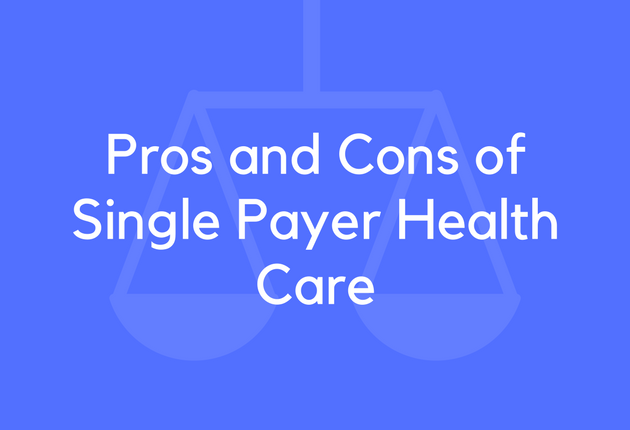Many Canadian provinces likewise have laws that actively discourage or straight-out restrict private insurance coverage plans from covering any of the advantages consisted of in the government program. what countries have universal health care. The UK's National Health Service also fits the definition of single-payer, with the country using basic tax earnings to pay for all citizens' healthcare.
Canada, by contrast, contracts with personal providers. Taiwan's healthcare system works likewise. New Zealand, Norway, Denmark and Sweden also have nationwide health services comparable to the United Kingdom, where the nation owns the suppliers and is accountable for paying them. No. Universal coverage refers to a http://jasperikoo611.theburnward.com/all-about-when-it-comes-to-health-care system where all homeowners have health coverage.
Some universal-coverage countries have great deals of various payers. Japan and Germany, for example, need people to enroll in among dozens of contending health insurance coverage plans (Japan has 3,500 insurance coverage strategies; Germany has a more modest 300). These are normally called "multi-payer" health care systems. There are lots of resemblances in between single-payer and multi-payer nations like Germany and Japan. what is a single payer health care system.
However they're still different paths to getting a nation's population guaranteed. If you want to get health economists into a furious dispute, you need to ask this concern. Some argue that Medicare, the federal program that covers all Americans over 65, counts as a single-payer system within the United States.
9 Easy Facts About What Is A Health Care Delivery System Explained
Medicare has a few of the characteristics typically associated with single-payer: lower administrative costs and high rates of coverage amongst elders. The Veteran's Administration and Medicaid are two other, federally-run insurance coverage strategies that often get referred to as single payer in mini. Other health economic experts, however, dislike this example. They argue that Medicare does not count as single-payer due to the fact that it's limited to a particular set of Americans, and not provided to all residents.
That stops it from negotiating (or simply setting) rates as low as those discovered in "genuine" single-payer systems. It does, however, work out prices lower than private health insurers. To put it Substance Abuse Treatment another method: If everyone in the United States were over 65, Medicare would be our single-payer system. However considering that there are great deals of under-65-year-olds here it's not a real single-payer system.
However then, compared to the US, pretty much every health-care system looks cost effective. Single-payer systems tend to have lower administrative expenses than those with numerous private insurance coverage companies, where doctors and hospitals devote lots of time to finding out who is supposed to pay them what quantity. One $12011 study in the journal Health Affairs approximated that American doctors invest four times as much cash connecting with healthcare payers than their Canadian counterparts.
Because physicians and pharmaceutical business basically have no choice however to accept the terms laid out by the government, single-payer systems typically include much, much lower costs than systems. The United States, for circumstances, pays a lot more for a lot of health-care services than single-payer systems do. It's worth noting that many multi-payer systems, like Germany, attain similar cost savings to single-payer systems by having the federal government set healthcare rates. how to start a non medical home health care business.
An Unbiased View of What Is United Health Care

Here's one chart from the Commonwealth Fund that looks at what percent of adults can get a same-day physician's appointment when they're ill (the single-payer systems listed below are Canada and the UK; all the rest, except for the United States, likewise have universal protection. Canada, a single-payer system, tends to have the longest wait times in this and other studies; the problem has become an increasing issue for lawmakers there.
For instance, in the United Kingdom, a single-payer country, it's simpler to get a same-day visit than in the United States. And multi-payer systems like Germany frequently have much lower wait times than the United States. Two alternatives: if you're really thinking about digging into your health care system, you can download a copy of T.R.
If you're trying to find something lighter, might we recommend a musical break from Canadian super-star Robin Sparkles. There's nobody, combined case versus publicly financed healthcare systems, but there are a couple of arguments that show up regularly. One is that single-payer healthcare might suppress development by regulating lower rates for health care providers and leaving them less space to experiment with brand-new treatments.
We pay more for nearly all medical treatments than publicly financed systems do. According this theory, the additional money permits pharmaceutical business, device producers, and other designers to explore brand-new, possibly groundbreaking experiments. Because view, the United States' greater healthcare costs are supporting medical developments that then proliferate around the world.
The Facts About How To Get License For Home Health Care Business Uncovered
This has actually been a concern in Canada particularly, where numerous provinces havedisallowed private plans that cover medical services in the federal program. The Canadian Supreme Court struck down this kind of law in Quebec, citing long haul times in the general public system as a reason private plans ought to be able to contend with the government.
Those dollars get divided up in such a way that, in all global examples offered, does not cover all the medical services that everybody desires. In single-payer systems, the government sets specifications for what services it will and won't cover. Nations frequently do this by taking a look at which treatments are "affordable" health-care-speak for which medical interventions deliver excellent results at a lower price.
In Britain, for instance, a company called the National Institute for Health Care Excellence is in charge of assessing what treatments it will pay for and in which situations. Britain will limit specific treatments to specific kinds of patients, based on where research shows them to be most effective, which can typically touch off strong debates.
That suggests these people never ever get access to health-care treatments regardless of whether it may assist. These individuals are effectively waiting forever, which will not appear on studies about wait times. Single-payer nations tend to get more beneficial ratings than the American health-care system. Here's a graph from the Commonwealth Fund's International Health Policy Research study, which shows the percent of each country's locals who believe the health system "works well" with "minor changes needed." Canada, Sweden, and the United Kingdom all have greater satisfaction rates with their health-care systems than the United States, with a lot more individuals who believe the system works well.
Getting My How To Lower Health Care Costs To Work
More of the latter: a single-payer system does not look most likely in the United States anytime soon. Throughout the battle over Obamacare, even the public alternative a single health insurance run by the federal government that would deal with personal rivals proved politically untenable in Congress. Seeing the unfavorable Browse this site political landscape, some states have actually checked out the alternative of building their own single-payer systems by themselves.
